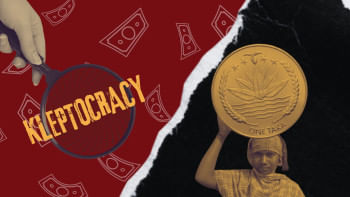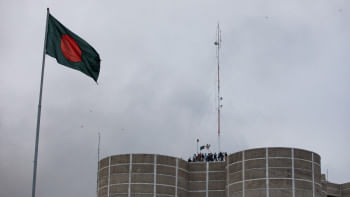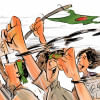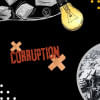Column by Mahfuz Anam: Strengthen the chief adviser's hands

Honestly, we had all lost hope about democracy, rule of law, good governance, accountability of public institutions, corporate governance, integrity in the leadership, free media, etc in Bangladesh. The only way forward was sycophancy and corruption. Options were "lick or fill," meaning either lick their feet or fill their pocket.
Students and citizens together have totally and unbelievably changed the scenario. They have forcibly opened all the doors that were firmly shut but for the lackeys. Suddenly, we are able to breathe again and dream again. But dreams are just as beautiful as they are fragile. Events are taking place that are likely to make the fulfilment of our dreams more difficult than they ought to be. There are occurrences that are unnecessarily raising questions about the interim government and creating doubts about its efficacy. These are happening both within the system and outside.
We start with the police. If any state institution contributed to bringing down the old regime, it was police. They were used by the then ruling Awami League as its own extension, but they later became a Frankenstein and implemented their own agenda. As the saying goes, "Old habits die hard," so now that the police are operating under the new regime, they are doing so in the very same way that they did before: abuse the law in implementing it.
Two journalists, former employees of Ekattor TV—not the best example of objective journalism—were picked up at the airport, handed over to the Detective Branch (DB) of police, and later charged with murder and placed on remand for four days. What law did they break? A murder charge? Their names were not in the original FIR, but were included later under the category of "unknown" miscreants (a most dangerous practice and one that should be scrapped immediately. Police can always add new names as investigation reveals). Even if they were big supporters of the discredited regime, they did not break any established law. The way to handle them is to criticise their journalism and expose their partisanship, but they cannot be jailed without specific charges of breaking the law.
Vandalising media establishments, TV stations—the latest incident occurring at the East West Media Group—deserve our condemnation. The policies of these establishments may have been unethical, one-sided and devoted to serving the fallen government, but their voices still cannot be forcibly shut. However blatant and unethical their journalism may have been, they cannot be subjected to physical attacks, arrests and intimidation.
These actions are creating a fear among journalists, raising the question as to whether we are returning to the old ways with the victims changing—instead of pro-BNP journalists, the victims are now the pro-Awami League journalists. We must not repeat past mistakes.
Then there was the incident at the court premises where former AL minister Dipu Moni was not protected by the police sufficiently to prevent pro-BNP lawyers from assaulting her. Police cannot avoid responsibility for this failure. But also, these partisan lawyers broke their own professional ethics and denigrated the court and their own profession.
We find it very worrying, the way murder charges are being slapped on former ministers, AL leaders, MPs, former judges, scholars, lawyers and, as mentioned above, on journalists without any proof. The approach seems to be "charge first, prove later." Too many murder cases are piling up against the former PM, which is already giving it an air of witch hunt. The more cases pile up, the less will be its credibility. A few well-founded cases that are supported by strong evidence is good enough to hold the former PM to account. But the way it is happening is already raising questions. What we are seeing is that cases are being filed with courts against the former prime minister, some AL leaders, some judges, lawyers, scholars—persons like Muntassir Mamoon, Shahriar Kabir, former Justice Enayetur Rahim, politicians Hasanul Huq Inu and Rashed Khan Menon (who was arrested last night). Many cases include 30, 40 or up to 120 names. All those on the list are being charged with murder with no specific evidence. The court then sends these cases to local police stations to be recorded. Then, randomly some people are arrested and others not. Such use of the legal process and filing cases for murder without any evidence are misuses of the law, which will only corrode public trust in the legal process and on the present dispensation.
We want to make the point that, like the former regime, such weaponisation of the legal system makes us feel that we are facing the same abuse of law as before. Many of the arrested ministers are being charged with murder instead of the crimes they are most likely to be found guilty of—abuse of power, financial sector crimes, bribery, corruption, banking fraud. Each time such murder cases are being filed, the legal process is coming under question.
Our law adviser has written volumes criticising such laws and practices. We expect him to remove such misuse of laws and ensure more credibility for the whole process.
Then there are other types of events that are increasing our worry about mob rule and people taking up law in their own hands. We really need to think about some of the incidents that have happened recently: i) forcibly entering the Secretariat and compelling the cancellation of remaining HSC exams; ii) forcing the interim government to grant promotions in bureaucracy and various government bodies; iii) forcing the removal of teachers from various posts in different campuses; iv) forcing the interim government to change appointments and dictating choices; and v) political parties competing to occupy critical posts in this transition period.
All the facts mentioned above are of great embarrassment to the interim government, and they are, however moderately, eroding public confidence. Part of what's happening can be accepted as unavoidable. When a powerful and long-standing government suddenly falls, there is a power vacuum, and both those with genuine grievances and the opportunists who try to take advantage of the power shift create situations like the ones mentioned above. Every day, there are demonstrations in front of the Chief Adviser's Office with endless demands, which are mostly self-serving rather than of national interest.
Prof Yunus's government is here only because of the love and respect he enjoys from the people, and especially from the students who spearheaded the latest uprising. They toppled the Sheikh Hasina government and opened up a whole world of possibilities. It's these possibilities that we must all work to try to bring to fruition. We are standing at the doorstep of a new Bangladesh. But we are also standing on very slippery grounds. It is slippery because we are a divided lot at the moment with the cronies of the old regime, power-hungry opportunists, and vested groups—especially those who looted the state coffers and our banks—waiting for a chance to subvert the interim government. This along with many of the advisers lacking experience in the governance process make the slippery grounds even more so.
As Prof Yunus said, let us not take a wrong step and miss the opportunity. In some cases, we seem to be doing so.
Mahfuz Anam is the editor and publisher of The Daily Star.
Follow The Daily Star Opinion on Facebook for the latest opinions, commentaries and analyses by experts and professionals. To contribute your article or letter to The Daily Star Opinion, see our guidelines for submission.

 For all latest news, follow The Daily Star's Google News channel.
For all latest news, follow The Daily Star's Google News channel. 









Comments